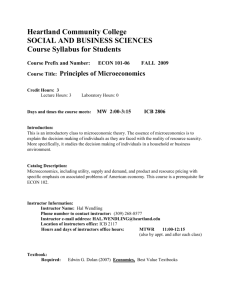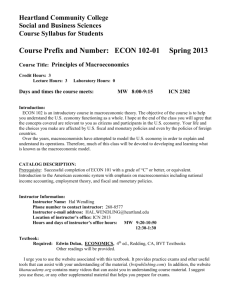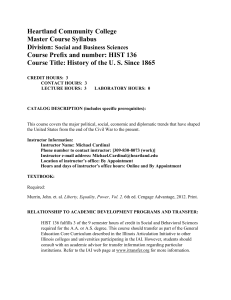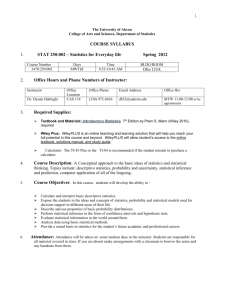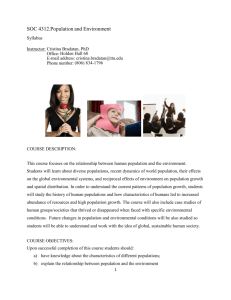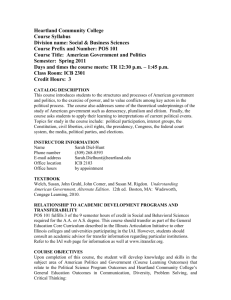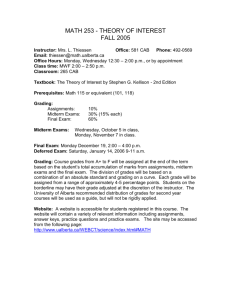[note to instructors: This is a template for creating course syllabi for
advertisement
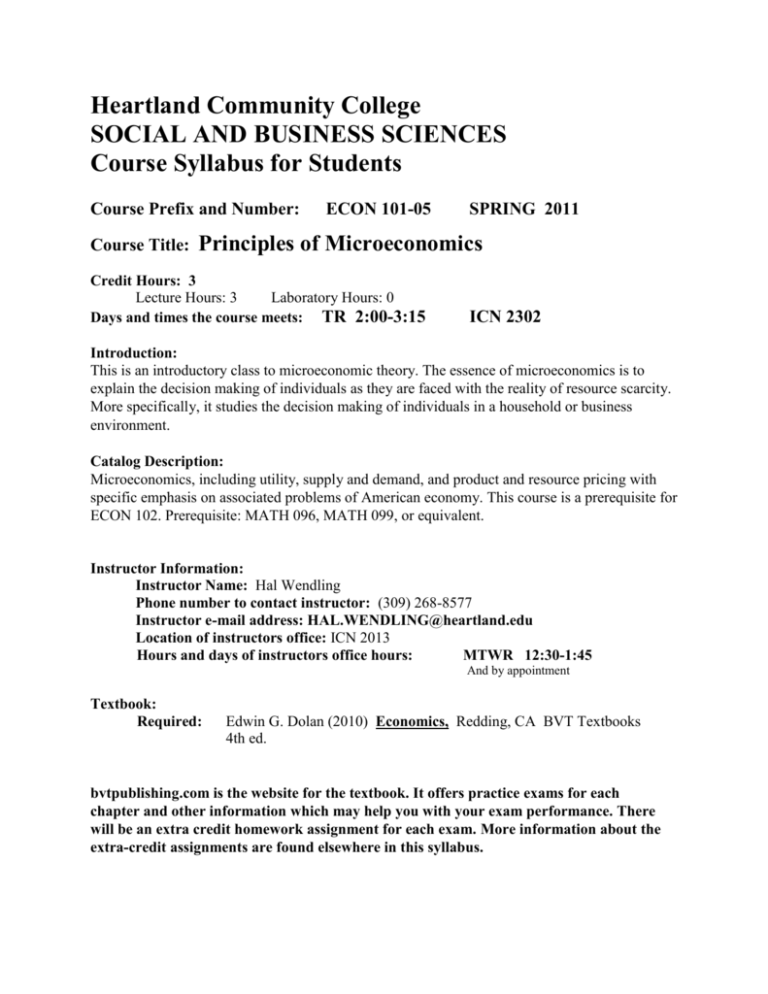
Heartland Community College SOCIAL AND BUSINESS SCIENCES Course Syllabus for Students Course Prefix and Number: Course Title: ECON 101-05 SPRING 2011 Principles of Microeconomics Credit Hours: 3 Lecture Hours: 3 Laboratory Hours: 0 Days and times the course meets: TR 2:00-3:15 ICN 2302 Introduction: This is an introductory class to microeconomic theory. The essence of microeconomics is to explain the decision making of individuals as they are faced with the reality of resource scarcity. More specifically, it studies the decision making of individuals in a household or business environment. Catalog Description: Microeconomics, including utility, supply and demand, and product and resource pricing with specific emphasis on associated problems of American economy. This course is a prerequisite for ECON 102. Prerequisite: MATH 096, MATH 099, or equivalent. Instructor Information: Instructor Name: Hal Wendling Phone number to contact instructor: (309) 268-8577 Instructor e-mail address: HAL.WENDLING@heartland.edu Location of instructors office: ICN 2013 Hours and days of instructors office hours: MTWR 12:30-1:45 And by appointment Textbook: Required: Edwin G. Dolan (2010) Economics, Redding, CA BVT Textbooks 4th ed. bvtpublishing.com is the website for the textbook. It offers practice exams for each chapter and other information which may help you with your exam performance. There will be an extra credit homework assignment for each exam. More information about the extra-credit assignments are found elsewhere in this syllabus. Relationship to Academic Development Programs and Transfer: This course fulfills 3 of the 9 semester hours of credit in Social Sciences required for the A.A. or A.S. degree. This course should transfer as part of the General Education Core Curriculum described in the Illinois Articulation Initiative to other Illinois colleges and universities participating in the IAI. However, students should consult an academic advisor for transfer information regarding particular institutions. Refer to the IAI web page at www.itransfer.org for more information. HCC Portal Just a reminder that to access WebCT, IRIS, and your Heartland Student Email, you will need to log into myHeartland, at https://my.heartland.edu. Beliefs: Academic Discipline: Economics. Student Learning: Responsibility shared with instructor. Instructor’s Role: My full-time job is helping you in the educational process. That means I am available to talk to you about this course or anything else that directly or indirectly concerns your education at Heartland. If you need help or have concerns that can’t be handled in class, then see me after class, during my office hours, or make an appointment. Don’t let yourself fall behind. COURSE/LAB OUTLINE: The following topics are to be covered during the instructional process: The Nature of Economics Scarcity and Trade Offs Supply and Demand Policies Affecting Supply and Demand Demand and Supply Elasticity Consumer Choice Theory Producer Theory Pricing and Output under Perfect Competition Pricing and Output for Monopolies Monopolistic Competition and Oligopoly Forms of Business and Stocks and Bonds Antitrust Legislation Labor Demand and Supply Labor Legislation Rent, Interest and Profits Methods of Instruction: The class will primarily operate with a lecture/discussion format. There will be relatively heavy use of overheads and possibly some videos. Although class participation is not graded, student participation in questions and discussions is designed to prepare you for the exams. Whether you participate mentally will play a significant part in your learning the material and thus, your grade. Letter grades will be based on the percentage of points earned in the course in accordance with the following scale: A = 90%-100% B = 80%-89% C – 70%-79% D = 60%-69% F = Below 60% Course Policies: Method of Evaluation (Tests/Exams, Grading System): Exam/Writing assignment #1 150 pts #2 200 pts #3 200 pts #4 200 pts Final 250 pts * *The final exam is mandatory and comprehensive. Attendance: Students are expected to be at every class and on time. Class begins at 2:00. You will be allowed two (2) absences without penalty. Your third, fourth, and fifth absence will cost you five (5) points. Your sixth, seventh, eighth, and ninth will be cost you ten (10) points per absence. If you are absent 10 or more times, you will receive an “F” in the course. You will be allowed one (1) tardy without penalty. Every tardy after the first, you will be penalized 5 points. I reserve the right to lock the door at 2:00 or shortly thereafter if tardiness by members of the class gets excessive. Students with no absences or tardies will earn bonus points. You don’t need to notify me of any upcoming absences. I don’t distinguish between excused and unexcused absences. However, if you have some special situation or needs, please discuss these things with me. Incompletes: Only given under extraordinary circumstances. This is solely at the discretion of the instructor according to the Heartland Community College guidelines. Make-up of tests and assignments: NO MAKEUP EXAMS. You will receive a zero on any exam you miss unless you have an excused absence. If you are excused from an exam, the weight of the final exam will be increased by the point value of the exam you missed. In addition, should you be excused from an exam you will have a 1-2 page written assignment due in order to have those points assigned to the final. This is not your choice! The instructor will decide the validity of your excuse. Student Conduct: - Any form of cheating will not be tolerated. - Lectures and class discussions may not be recorded. - No eating or sleeping in class. - Students are responsible for all readings and material covered in class - Turn off your cell phone during class/cell phones not allowed as calculators for exams - No lap-top computers - No hats worn on test days NOTE: The penalty for the above violations can range from a friendly verbal warning to dismissal from a class session or dismissal from the course. Class Cancellations: Usually the instructor will be able to notify you if any future classes are to be cancelled. All HCC class cancellations should be listed on the HCC website. Go to http://heartland.edu/classCancellations if in doubt. Syllabi disclaimer: You will be notified of any changes to this syllabus. If an exam or assignment is due during a class period when class is cancelled, the new exam or due date is the next scheduled class period. Course Calendar: Date Chapters Covered Exam #1 R 2/3 1-3 Exam #2 R 3/3 4,5,8 Exam #3 R 4/7 9,10,11,12 Exam #4 R 4/28 13,15,16 FINAL* T 5/10 2:00 All of the above + (possibly Chap. 6) And class lecture Although it is extremely difficult to plan a day by day calendar because of the large number of variables present in teaching various classes, I am required to provide a weekly calendar for this course. Please keep in mind this weekly calendar is subject to revision at any time. The numbers on the right represent chapters from the text. Always keep in mind other non-text provided material is likely to be presented in class. Week 1 - Intro and 1 2 - 1,2 3 - 2,3 4 - 3, exam #1 5 - return exam, 4 6 - 4,5 7 - 5,8 8 - 8, exam #2 9 - Spring break 10 - return exam, 9 11 - 9,10 12 - 10,11 13 - 12, exam #3 14 - return exam, 13 15 - 13,15 16 - 16, exam #4 17 - return exam, wrap-up, review 18 - Final EXTRA-CREDIT – For each of exams 1-4, go to the textbook website and take one practice quiz from each of the chapters covered for that particular exam. Print each quiz, staple once in the upper left hand corner and put your name in the upper right hand corner. You can earn up to 10 extra-credit points if this is done. You will lose points for not following any of the above instructions. These will be collected immediately before the class begins taking the “real” exam. Late will not be accepted. Although the bonus points may help your grade, the real benefit will be the practice in taking an exam. Outcomes Demonstrate a knowledge of the concepts of scarcity, choice, and efficiency Demonstrate a knowledge of supply and demand theory, functioning of markets, and price, cross-price, and income elasticities Demonstrate a knowledge of consumer choice/utility theory Demonstrate a knowledge of producer theory, the relationship between a firm’s inputs and outputs, and a firm’s short-run and long-run costs and revenues Demonstrate a knowledge of price and output determination for firms under four different market structures—perfect competition, monopoly, monopolistic competition, and oligopoly—including antitrust regulations Demonstrate a knowledge of the functioning of labor markets Demonstrate a knowledge of income distribution and income equality/inequality Interpret data and graphs General Education Outcomes CT2 PS2 CO2 DI2 CT2 Range of Assessment Methods Writing Assignments, Exams, Quizzes, Discussion Writing Assignments, Exams, Quizzes, Discussion Writing Assignments, Exams, Quizzes, Discussion Writing Assignments, Exams, Quizzes, Discussion Writing Assignments, Exams, Quizzes, Discussion CT3, PS3 Writing Assignments, Exams, Quizzes, Discussion Writing Assignments, Exams, Quizzes, Discussion Writing Assignments, Exams, Quizzes, Discussion

